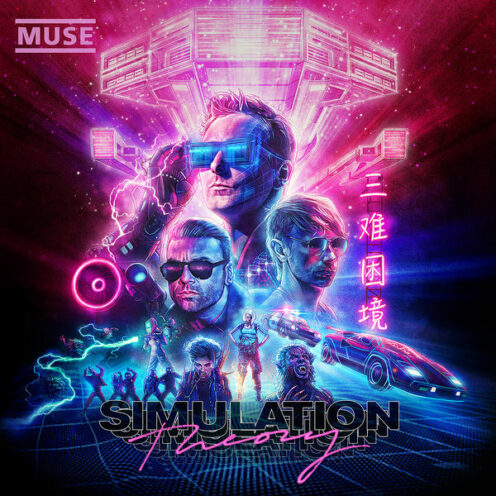
Synth lovers, rejoice! Muse have crafted a powerhouse of a record in Simulation Theory that is one of the more immediately gratifying albums to date. From the futuristic artwork that could easily be mistaken for the poster art of the next Blade Runner film, Muse has their sights set on making everything that they have alluded to in the past few efforts bigger and brighter.
From the dramatic introductory track, “Algorithm” sets the stage perfectly for a thrilling ride of an album. Lead singer and guitarist Matt Bellamy opens the set by singing, “Burn like a slave/Churn like a cog/We are caged in simulations/Algorithms evolve/Push us aside and render us obsolete.” Bellamy and company have never been strangers to using samples and synths to enhance their sound, but on Simulation Theory, they ultimately went for everything that they had been hinting at over the past few LPs.
The second song, “The Dark Side,” is a great choice of a first single for the record that doesn’t seem to have a shortage of exciting moments. The pulsating bass line from Chris Wolstenholme plays effectively off of the anthemic choruses from Bellamy, as Muse delivers another great song in their catalog that is now eight albums deep. “Pressure” finds Muse experimenting with some starts and stops to the beat, all the while staying true to who they are as a band. Lyrics such as, “I’m feeling the pressure/I can’t break out/No one can hear me scream and shout/Get out of my face, out of my mind/I see your corruption/I’m not blind,” show that Muse are not immune to making subtle political statements while not overly forcing the issue either.
“Propaganda” is one of the stranger songs on the record, with several samples, heavy synths, and vocal effects found throughout the track. It’s as close as Muse have ever gotten to making a dubstep song. On any other album, this song would have seemed clumsily out of place, but they knew exactly what direction they were going for and pulled it off. While “Break it to Me” finds Bellamy in a near-rapping state over some heavy riffs and ever-present synths that reminded me more of Rage Against the Machine’s “Killing in the Name” than any other song in Muse’s discography. However, the chorus of the song is still vintage Muse where Bellamy croons, “And I can handle the truth/I can cope with whatever you’re holding back/No need to sugar coat.”
For those in need of a dose of some less synth-y Muse efforts, look no further than the mid-album standout, “Something Human.” With some delicately played acoustic guitars in the background that blends into a Spanish-type beat midway thru the song, Muse makes sure that they have made a connection with every fan that looks for the variety in their band’s repertoire.
“Thought Contagion” gets the mysterious vibes going early and often, with some wailing guitars, sing-a-long choruses, and some trademark piano strokes to bring the song home. It’s almost as if Muse were thinking of challenging themselves in every aspect of their songwriting craft by finding new and refreshing elements to bring into their sound. My personal favorite on the record, “Get Up and Fight,” features the slow and steady build-up to one of their more epic choruses in recent memory where Bellamy shouts, “Get up and fight/Get up and fight/I can’t do this thing without you/I’m lost in this without you/Get up and fight/We’ve gotta get up and fight/I can’t handle this without you/Can’t do it without you.” Bellamy’s earnest vocal delivery is easy to get sucked up into and believe every word that comes out of his mouth. Not to mention, the drumming of Dominic Howard gets this track to even greater heights with some killer fills and percussion.
The opening of “Blockades” sounds like a riff that Chvrches would love to have the rights to sample, yet Muse has their fingerprints all over this epic song and makes every note count. “Dig Down” on the other hand, sounds like the direct sequel to “Madness” with its eerily similar song structure and pulsating sounds. Although Muse doesn’t cover much new ground on this particular song, it fits well with everything else around it so that we can forgive them for a little bit of duplication.
By the time you get to the closing track of “The Void,” you will have come to the same conclusion as I did: Muse is at the top of their game. From the electronic-tinged backing beats to the spectacular artwork, everything connects perfectly into place on their eighth album. Cohesive and immediately gratifying, Muse has delivered one of my favorite albums of 2018.